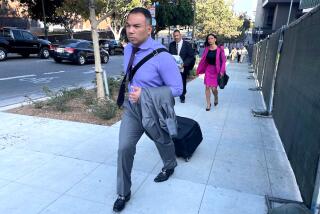Final Death Blow to Organization Tied to Murders in Chicago Is Seen Possible : Crime: First of a series of trials opens for members of El Rukn, which ruled areas of city through violence and fear.
- Share via
CHICAGO — Jurors have begun hearing testimony in the first in a series of trials that federal prosecutors say should be the coup de grace to an organization that once had seemed all but unstoppable.
For a quarter of a century, the El Rukn Nation, under one name or another, has ruled large swaths of Chicago’s South Side through violence and intimidation.
Called the nation’s “ultimate street gang” by investigators in the early 1980s, the El Rukns built their powerful drug and real estate empire in the 1960s with the help of federal anti-poverty funds.
Its leader and founder, Jeff Fort, became a darling of the radical left, receiving hundreds of thousands of dollars from wealthy benefactors who thought they were helping the black community.
Fort recast the gang as an Islamic religious organization in the mid-1970s, and by 1987 the El Rukns had tried to add political terrorism to their list of criminal activities. The group plotted to destroy government facilities in 35 cities and blow up an airplane at the behest of the Libyan government. None of the plans were carried out.
“This is not ‘West Side Story,’ ” Assistant U.S. Atty. Theodore Poulos told jurors last week. “This is not a group of misguided youths hanging out on street corners . . . . The El Rukns were an occupying force on the South Side that ruled with an iron fist, with guns and murder.”
The name El Rukn (pronounced El Roo-ken) means “The Foundation” in Arabic.
Even though Fort, 44, has been imprisoned since 1983 and is serving two consecutive sentences totaling 155 years for murder and conspiracy, prosecutors say he continued to run El Rukn operations until 1989. That was when prosecutors indicted 65 remaining members of the organization in simultaneous raids in eight states. Charges included murder, kidnaping, racketeering and possession and sale of narcotics.
The indictments alleged that members of the group committed at least 20 known murders and contract killings, including one in South Carolina at the behest of Chicago businessman Noah R. Robinson, the half-brother of the Rev. Jesse Jackson.
Robinson, who was charged in the same indictments with fraud in connection with the skimming of $650,000 in receipts from several Wendy’s restaurants he owned, was convicted last year and is serving a six-year prison sentence. He is serving the time consecutively with a previous 10-year sentence for being an accessory to attempted murder in South Carolina.
In testimony in the current trial so far, jurors have heard about gang murders and drug dealing and also about the El Rukn’s extensive real estate holdings on the South Side. News reports once valued the worth of the holdings, which included hotels and dilapidated apartment buildings, at $2.6 million.
Defense attorneys have tried to discredit witnesses, who include high-ranking El Rukn “generals.” One lawyer, Robert Gevirt, portrayed them in his opening statement as “a parade of murderers, extortionists and drug dealers” who cut deals with prosecutors to benefit themselves.
“In the 1950s (this) was called naming names,” said defense attorney Deborah Gubin, comparing the trial to the hearings of the House Committee on Un-American Activities. “Are these people giving up names to save themselves, or are they telling the truth?” Not all El Rukns committed criminal acts, she said.
If convictions result from the charges, prosecutors said it would be the final death blow to the organization often described as a modern-day equivalent of the Prohibition-era gangsters who ruled much of Chicago in the 1930s.
The government already has seized the fortified two-story former theater, named the El Rukn Grand Major Temple but popularly called the Fort, that served as the El Rukn headquarters. Mayor Richard M. Daley and police officials held a ceremony to mark the occasion when wrecking crews began tearing it down last year.
The trial of 14 mid-level El Rukns--called ambassadors on the gang’s organization chart--is the first of three scheduled for this year. It is being held under unusually heavy security, with more than 20 U.S. marshals stationed inside the courtroom and outside. Spectators are prohibited from even waving at the defendants.
Prospective jurors and finalists were identified only by number to protect them from possible retribution or harassment.
This is because four jurors in Fort’s 1987 trial on charges of plotting acts of terrorism received threatening phone calls during the trial. Also, relatives of a key witness in that trial were shot and wounded in an apparent attempt at intimidation.
More to Read
Sign up for Essential California
The most important California stories and recommendations in your inbox every morning.
You may occasionally receive promotional content from the Los Angeles Times.













